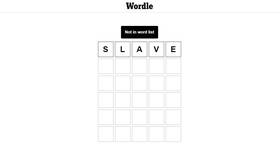‘Slave’ is not a word anymore for NYT’s hit puzzle game

The New York Times has eliminated certain “obscure” and “insensitive” words from the pool used by the popular puzzle game Wordle, after purchasing it last month. The newspaper confirmed the censorship on Tuesday, after players noted the elimination of certain words. Critics say the absence of ‘slave’ from the new vocabulary is particularly baffling.
Some of the examples that players discovered, as reported last week by group blog website BoingBoing, are simply profane to some degree, like the word ‘wench’, as well as a certain euphemism for female genitalia. Others came from less well-known parts of the English dictionary, like ‘agora’, the Greek word for a place of public meetings.
“We are updating the word list over time to remove obscure words to keep the puzzle accessible to more people, as well as insensitive or offensive words,” a New York Times spokesman said this week. The explanation apparently conflicts with the newspaper’s earlier assurances that under the new ownership, “nothing has changed about the game play.”
The NYT appears to be doing its utmost to protect itself from potential heat from online mobs for words they could deem offensive. Many racial slurs were cut out of the word pool, as were the words ‘lynch’ and ‘slave’.
Some people on social media say the newspaper has gone too far, calling the changes “baffling,” while others believe it is ruining the game.
Baffling that the NY Times has banned people from guessing words like “slave” on Wordle in case it causes offence (to who?) Fair enough not to have it as an answer, if they must, but to erase it as a valid word is a touch thoughtcrimey. I’ll stick to the Ancient Greek Wordle
— Patrick Kidd (@patrick_kidd) February 16, 2022
Others say it’s typical for the New York Times to police language to supposedly tackle issues of racism.
Scenes from our twee cyberpunk future: the New York Times has bought Wordle and is censoring words it thinks you’re too delicate to handle being able to use as guesses. pic.twitter.com/UdC3FsAjNq
— Stephen Bush (@stephenkb) February 15, 2022
I decided to start with slave, they removed slave from the dictionary and apparently this solves all the problem related to slavery! Bravo!#Wordlepic.twitter.com/LuzhUt1nUR
— ژاژا (@0pinionist) February 14, 2022
Wordle is a game that gives you six attempts to guess a five-letter word once a day – the same for every player. With each try, it offers clues, showing whether you have used the correct letters and placed them in the correct positions. The process, represented by green lines and yellow boxes, can be shared without revealing the solution.
The popularity of the free puzzle game has skyrocketed in the past several months, with millions of players hooking up worldwide. In January, the New York Times purchased Wordle for an undisclosed seven-figure amount.











